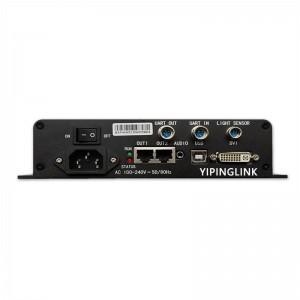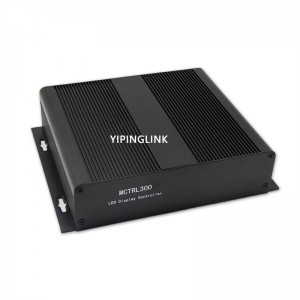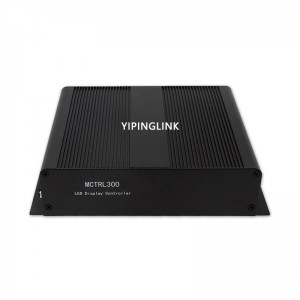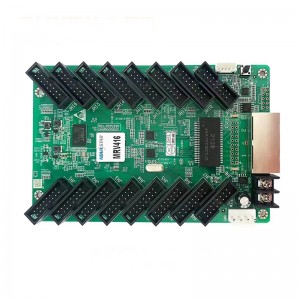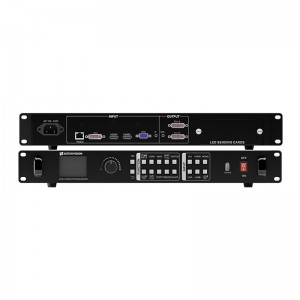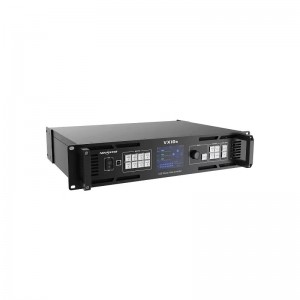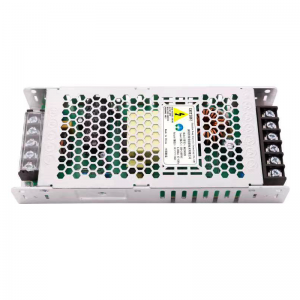Novastar MCTRL300 Nova LED Display Sending box
Introduction
The MCTRL300 is an LED display controller developed by NovaStar. It supports 1x DVI input, 1x audio input, and 2x Ethernet outputs. A single MCTRL300 supports input resolutions up to 1920×1200@60Hz.
The MCTRL300 communicates with PC via type-B USB port. Multiple MCTRL300 units can be cascaded via UART port.
As a highly cost-effective controller, the MCTRL300 can be mainly used in the rental and fixed installation applications, such as live events, security monitoring centers, and various sports centers.
Features
⬤2 types of input connectors
− 1x SL-DVI
− 1x AUDIO
⬤2x Gigabit Ethernet outputs
⬤1x light sensor connector
⬤1x type-B USB control port
⬤2x UART control ports
They are used for device cascading. Up to 20 devices can be cascaded.
⬤Pixel level brightness and chroma calibration
Working with NovaLCT and NovaCLB, the controller supports brightness and chroma calibration on each LED, which can effectively remove color discrepancies and greatly improve LED display brightness and chroma consistency, allowing for better image quality.
Appearance
Front Panel

Rear Panel

| Indicator | Status | Description |
| RUN(Green) | Slow flashing (flashing once in 2s) | No video input is available. |
| Normal flashing (flashing 4 times in 1s) | The video input is available. | |
| Fast flashing (flashing 30 times in 1s) | The screen is displaying the startup image. | |
| Breathing | The Ethernet port redundancy has taken effect. | |
| STA(Red) | Always on | The power supply is normal. |
| Off | The power is not supplied, or the power supply is abnormal. | |
| ConnectorType | Connector Name | Description |
| Input | DVI | 1x SL-DVI input connector Resolutions up to 1920×1200@60Hz
Custom resolutions supported Maximum width: 3840 (3840×600@60Hz) Maximum height: 3840 (548×3840@60Hz) DOES NOT support interlaced signal input. |
| AUDIO | Audio input connector | |
| Output | 2x RJ45 | 2x RJ45 Gigabit Ethernet ports Capacity per port up to 650,000 pixels Redundancy between Ethernet ports supported |
| Functionality | LIGHT SENSOR | Connect to a light sensor to monitor ambient brightness to allow for automatic screen brightness adjustment. |
| Control | USB | Type-B USB 2.0 port to connect to PC |
| UART IN/OUT | Input and output ports to cascade devices.Up to 20 devices can be cascaded. | |
| Power | AC 100V-240V~50/60Hz | |
Dimensions
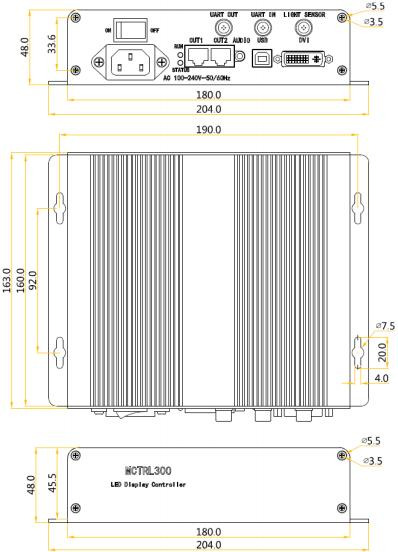
Tolerance: ±0.3 Unit: mm
Specifications
|
Electrical Specifications |
Input voltage | AC 100V-240V~50/60Hz |
| Rated power consumption | 3.0 W | |
|
Operating Environment |
Temperature | –20°C to +60°C |
| Humidity | 10% RH to 90% RH, non-condensing | |
|
Physical Specifications |
Dimensions | 204.0 mm × 160.0 mm × 48.0 mm |
| Net weight | 1.04 kg
Note: It is the weight of a single device only. |
|
|
Packing Information |
Cardboard box | 280 mm × 210 mm × 120 mm |
| Accessories | 1x Power cord, 1x Cascading cable (1 meter), 1x USB cable, 1x DVI cable | |
| Certifications | EAC, RoHS, CE, FCC, IC, PFOS, CB | |
Note:
The value of rated power consumption is measured under the following conditions. The data may vary due to the onsite conditions and different measuring environments. The data is subject to actual usage .
A single MCTRL300 is used without device cascading.
A DVI video input and two Ethernet outputs are used.
Video Source Features
| Input Connector | Features | ||
| Bit Depth | Sampling Format | Max. Input Resolution | |
| Single-link DVI | 8bit | RGB 4:4:4 | 1920×1200@60Hz |
FCC Caution
Any Changes or modifications not expressly approved by the party responsible for compliance could void the user's authority to operate the equipment.
This device complies with part 15 of the FCC Rules. Operation is subject to the following two conditions: (1) This device may not cause harmful interference, and (2) this device must accept any interference received, including interference that may cause undesired operation.
Note: This equipment has been tested and found to comply with the limits for a Class A digital device, pursuant to part 15 of the FCC Rules. These limits are designed to provide reasonable protection against harmful interference when the equipment is operated in a commercial environment. This equipment generates, uses, and can radiate radio frequency energy and, if not installed and used in accordance with the instruction manual, may cause harmful interference to radio communications. Operation of this equipment in a residential area is likely to cause harmful interference in which case the user will be required to correct the interference at his own expense.



